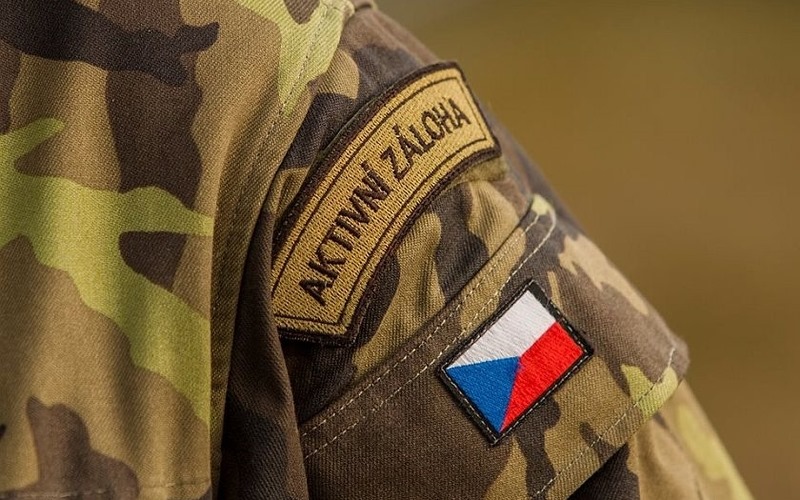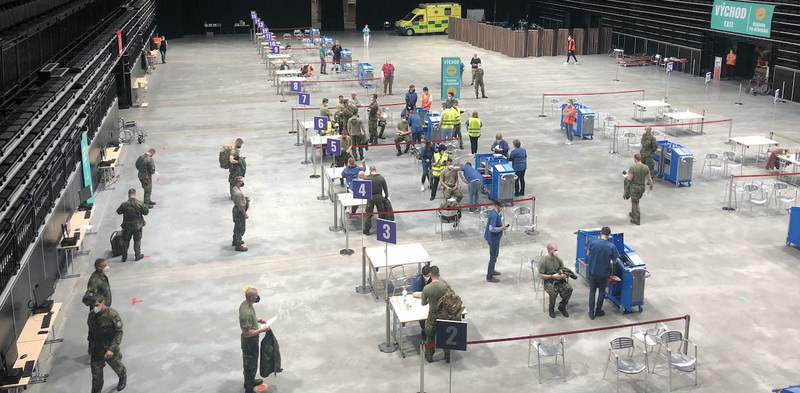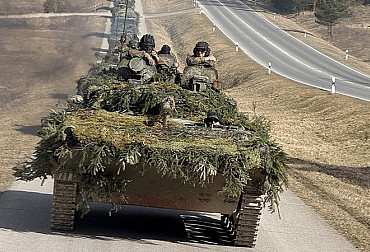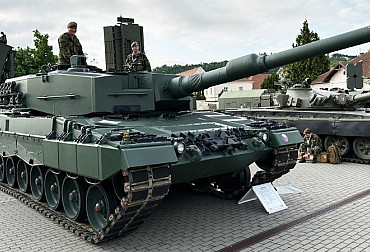The Army will call in Active Reserve soldiers
The Army will call in Active Reserve soldiers. The decision was made by the Chief of General Staff, Army General Aleš Opata. Active Reserves will help at the National Vaccination Center in Prague, where they will strengthen the personnel of the Central Military Hospital. The Army will deploy the Active Reserve from July 14 to August 15, 2021 in shift mode, and will complement the professional soldiers who have been serving in the Center since its opening.
 Picture: The Army will call in Active Reserve soldiers. The decision was made by the Chief of General Staff, Army General Aleš Opata. | Ministry of Defense of the Czech Republic
Picture: The Army will call in Active Reserve soldiers. The decision was made by the Chief of General Staff, Army General Aleš Opata. | Ministry of Defense of the Czech Republic
Deploying the Active Reserve in the fight against the pandemic is a pilot project. "The reservists helped volunteers throughout the pandemic in various ways. Now is the time to call them to the service. We also want to verify the process of mass calling in Active Reserve, which has been governed by new legislation since 2016,” General Opata explains.
Soldiers of the Active Reserve will take turns after seven days, there will be 55 of them in each rotation. A total of 220 will be exchanged in four weeks. Each will spend 11 days in deployment, in addition to the seven-day shift, another four days are used to start and take compensatory leave for the fourteen-hour shift.
The Prague Vaccination Center is operated by the Central Military Hospital in Prague and is organized by the Army. Seventy professional soldiers provide assistance in the shift regime. The soldiers also oversee the operation and safety of the center's operations. From July, they would be supplemented by the reservists.
"The reservists will be called by summons," Colonel Antonín Genser, Commander of the Territorial Forces, says. "Although the law does not require it from the Army, the reservists have been approached in advance and only those who will not be seriously involved in their private or professional life will be called in. Because the times are not easy."
 Picture: The National Vaccination Center at the O2 Universe can be found in Prague 9 near the O2 Arena | Ministry of Defense of the Czech Republic
Picture: The National Vaccination Center at the O2 Universe can be found in Prague 9 near the O2 Arena | Ministry of Defense of the Czech Republic
Soldiers in the Active Reserve will be called to the Regional Military Headquarters of the Capital City of Prague and the Central Bohemian Region. Soldiers will start shifts from their place of residence.
The chief hygienist of the Ministry of Defense recommended vaccinations against the covid to the reservists before deployment. However, vaccination is not mandatory. If the reservists want to be vaccinated, we will inoculate them. A 30-day call-up period will be used for this. The first dose of vaccination is also fully sufficient.
"We are considering the operational deployment of the Active Reserve for each new task," Lieutenant General Josef Kopecký explains. "In this deployment, we have been waiting for higher vaccination coverage in society and we will also have vaccines for Active Reserve so that everyone has the same protection."
The monthly operational deployment of reservists may be extended if the pilot project proves successful and the Army continues to be needed at the National Vaccination Center. Active Reserve soldiers can be deployed on Czech territory for up to seven months a year, deployment can be preceded by up to twelve weeks of training.
The Army is also renewing the full-time training of Active Reserve units. From June, hundreds of Active Reserve soldiers will resume their practical training.
In connection with the deployment of part of the soldiers of the Active Reserve, we asked two reservists a few questions.
1) This is the first official deployment of Active Reserve in the fight against the covid-19 pandemic. Surely you are aware that it will be a stress test for Active Reserve and the soldiers in the Active Reserve will then be viewed exactly as they manage this "action". Isn't that binding?
ctive Reserve soldier Jan: Not at all, on the contrary. I joined the Active Reserve precisely so that, if necessary, I would be available and ready to help where the Army, and therefore our Republic, needed it. I think I speak for everyone committed when I say that it is an honor, and at the same time a satisfaction, that after years of practice, we have the opportunity to prove our qualities in real action. That is why I am convinced that we will fulfill our tasks with full commitment and 100%.
Active Reserve soldier Tomáš: Of course, it is a certain responsibility, but here we have already taken on ourselves by entering the Active Reserve and we take on ourselves in our own way at every opportunity when we wear a uniform. I dare say that for the vast majority of us, the feeling of responsibility and the effort to help and be useful is the main motivation that led us to join Active Reserve at all. On the contrary, I see it as a great opportunity to show the public, the Army, and in fact ourselves, that we have the ability to do so, we are able to perform tasks in operational deployment and be a valuable part of the security forces of the state. It would be a shame to miss this opportunity. We are soldiers, waiting patiently and obeying orders. However, it is not a big secret that for many reservists, the current situation, where we are forced to just sit idly by and watch, brings some disappointment. It is not only a potential deployment, but also canceled exercises. So I would not consider it binding. As a challenge, a responsibility and an opportunity, certainly yes.
2) Soldiers in Active Reserve are regularly released by the employer for training, but this time it will be an operational deployment. How does your employer take this fact?
Active Reserve soldier Jan: Fortunately, we manage to be relatively easily replaced in our work, so my employer has no problem with my release.
Active Reserve soldier Tomáš: I have full support from my employer, I definitely can't complain. What I had the opportunity to hear from colleagues, most would be able to arrange at work.
3) Despite all possible safety precautions, you will be more likely to become infected than in civilian life. How do your surroundings, family, acquaintances react to this?
Active Reserve soldier Jan: Personally, I don't bother too much about it - it's something that needs to be accepted. Paramedics have been living in this for over a year. Due to working in this hazardous environment, we can be expected to be vaccinated with at least the first dose of the vaccine before use. If a covid infection still occurs, the vaccine should at least protect us from a severe course. Then it is rather important not to spread the infection further.
Active Reserve soldier Tomáš: Some concerns appear, the family asked about the possibility of vaccination. Personally, I'm not afraid of infection, I'm thirty, I've already helped paramedics as a volunteer, I follow all the precautions and I haven't had covid yet. I think that if a person honestly follows all measures, he has a decent chance to avoid the infection completely.





















